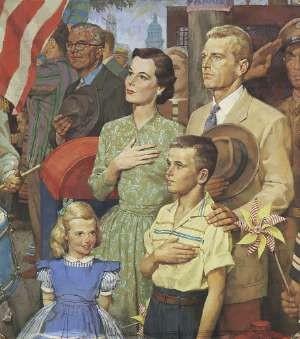Happy Birthday, America: an Immigrant’s Journey
By • July 12, 2012 0 1567

I became a United States citizen in 1959 on my 18th birthday after I had already graduated from South Amherst High School, in South Amherst, a small (pop. 1,500 or so) town, south of Cleveland, Ohio, with all the requisite virtues of small town life along with some of its restrictions and limitations.
I raised my right hand and swore to uphold and all the rest in a county court in Elyria, Ohio. I think I loved this country, the United States of America, long before I swore to obey its laws and honor it in the company of other citizens-to-be who came from everywhere.
I started to love this country when I first set foot on American soil for real–the New York airport doesn’t count. That was in 1952 when I was put on a TWA propeller driven airliner that took me from Munich, to Paris to New York. I was all off ten years old, couldn’t speak a word of English or American, except “hot dog” and “GI Joe.”
I was the last installment in a three-pronged immigration plan begun when my step-father, Mihailo Radicanin, who came here for a job in the U.S. Steel mill in Lorain, Ohio, a mid-sized city near Lake Erie where many of his fellow Yugoslavians, a-k-a Serbs and Croatians, had come to join the great and soon-to-boom American work force. In time, Mihailo earned enough money to send for my mother, a factory worker, Bavarian, and a divorced mother whom he married here. Four years later, it was my turn to come to America.
I mention all this because at that age–even then–I wanted to be an American more than anything in the world except a cowboy, which was the same thing in my mind. I loved hot dogs immediately–ate a dozen at my first picnic and got sick–but I also loved the movies, the abundance of books, both comic and actual, the blue skies which I knew stretched to everywhere out there in this big country. Coming from a country which was still clearing out rubble from its major cities in the wake of World War II, the streets of Ohio, the farmlands surrounding South Amherst, the car-filled roads, the football and baseball fields, the homeyness of American homes seemed as fresh as a hearty baby to me. Mihailo drove a 1952 Pontiac which I would drive into an apple tree years later.
I fell in love immediately, much like an adolescent boy gets stone smitten by the sight of an impossibly beautiful girl except that the girl rewards the love in impossible ways. I heard that phrase a lot over the years: the pursuit of happiness and I think I understood it a little better than some because my memories of Germany were always close to the surface, with additions from studies in recent history. My stepfather and mother understood it too–they weren’t rich, not even without economic worry since strikes and layoffs were regular features of the economy in the 1950s. But they acquired a house on eight acres in the South Amherst area for $8,000, which included an apple orchard, a bunch of chickens, plowed lanes and a falling-down barn.
They retired to Sun City, Arizona, which did not have cowboys, but I was long out of the house by then. I grew up and was raised through an American childhood. I learned to love the country–not uncritically, without question–but with an enduring passion for the old verities of freedom of thought, diversity, tolerance and such even when they were not being practiced. There was a reason there were so many people named Washington and Jefferson in America.
I lapped it all up in my growing up in small town America. Every year in high school, I won an American Legion essay contest on patriotism and its American variations. This essay is probably not as good or as fresh as any of the ones from my youth.
I grew up in sunlight and the green grass of a long front yard which I mowed diligently. I know that in America, opportunity always beckons, not always obviously, not in equal ways, but nonetheless, in all manner of occurrences. I feel even at this advanced age, lucky to live here, in the nation’s capital, to take in its history, its celebrations of history, the closeby breath of history.
I thought about this going through the exhibition about the War of 1812, thinking of Decatur House, of Andrew Jackson in Lafayette Park. Lake Erie looms big in this tale, which is large and complicated, and the words of Oliver Hazard Perry, “We have met the enemy, and they are ours,” our part of Ohio junior high school history books along with Tecumseh. Here, the British torching of government buildings in 1814 is a local tale, but “the Star-Spangled Banner” is everyone’s song.
To this day, I remember, as Neil Diamond sings in his hokey but undeniably affecting song, “Coming to America.”
That was 50 years ago on a month in June, a summer in Ohio beckoning. Mihailo passed away in Sun City in the late 1990s; my mother followed in the post 9/11 world. And here I am, still in love with America, waywardly, critically, but always passionately.
Happy Fourth of July. Happy Birthday, America.

